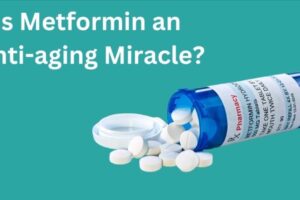Nicknamed “the master antioxidant,” glutathione (GSH) is essential for every cell in your body. As you age, your body’s ability to produce glutathione decreases, even though your need for it increases.
Your body makes glutathione using three amino acids: glutamate, glycine, and cysteine, mainly in your liver. Glutathione’s key role is to fight free radicals—unstable molecules that can damage cells and cause oxidative stress.
Free radicals are created both from the environment and by your body when it turns oxygen into energy. These molecules are unstable because they lack electrons and steal them from other molecules, causing oxidation and oxidative stress when they outnumber antioxidants. Left unchecked, oxidative stress can contribute to a smorgasbord of health conditions and chronic diseases including diabetes, cancer, cardiovascular disease, Alzheimer’s, kidney disease, and more (1).
What Is Glutathione?
Glutathione is made from three amino acids: glutamate, glycine, and cysteine. Most of it is produced in the liver.
Its main role is to combat free radicals, unstable molecules that can damage cells and cause oxidative stress. Free radicals are created both in the environment and by the body’s mitochondria during energy production.
Free radicals are unstable due to missing electrons, and they steal electrons from other molecules, causing oxidation. When free radicals outnumber antioxidants, this imbalance leads to oxidative stress, which can contribute to various health issues such as diabetes, cancer, heart disease, Alzheimer’s, and more.
Glutathione is an antioxidant that neutralizes harmful free radicals, preventing them from damaging your cells and DNA. It donates electrons to these free radicals, stopping them in their tracks. Besides its role as an antioxidant, glutathione helps detoxify the body by binding to toxins, making them water-soluble, and allowing for their elimination. Additionally, glutathione is crucial for a strong immune system, supporting white blood cells like macrophages in fighting off invaders and removing dead cells.
What Happens if You Don’t Have Enough Glutathione?
As you get older, your body makes less glutathione, which can make you more prone to various diseases and health problems (1,2). Other factors like inflammation, drinking alcohol, genetics, and illness can also lower glutathione levels.
Low glutathione has been associated with several conditions and issues, including:
- Asthma
- Alzheimer’s
- Autoimmune disorders (rheumatoid arthritis, lupus, psoriasis, contact dermatitis, Crohn’s disease)
- Cancer
- Cardiovascular diseases
- Chronic liver disease
- Cognitive impairment
- Chronic obstructive pulmonary disease
- Cystic fibrosis
- Diabetes
- Depression
- Fibromyalgia
- High blood pressure
- Infertility
- Leaky gut syndrome
- Mental health disorders
- Multiple sclerosis
- Obesity
- Parkinson’s disease
- Stroke
- Thyroid disease
Health Benefits of Glutathione
Researchers are still learning about glutathione, but animal and human studies have provided some insights. Here’s what they know so far and how they think glutathione might improve your health.
Reduce oxidative stress
Glutathione is known for fighting free radicals, and a 2019 study found it effectively reduces oxidative stress in the lab (3). The journal Nutrients called glutathione a “promising” treatment for combating tissue and cell damage (4).
Research suggests that taking glutathione supplements might enhance this effect and protect against age-related diseases like cancer and diabetes.
In a study, healthy adults taking glyNAC, a supplement that increases glutathione levels, showed reduced oxidative stress and inflammation after 24 weeks of treatment.
Boost immunity
Glutathione may strengthen your immune system to better fight infections. It supports T cells and natural killer cells, which help other white blood cells attack and destroy invaders. A Frontiers in Immunology study suggests that GSH “fine-tunes” your immune response (6) so that it can jump into action without going into overdrive.
A small clinical trial also found that people taking glutathione supplements had higher levels of natural killer cells and lymphocytes, which are key to fighting infections (7).
Improve Brain Health
Low levels of glutathione in the brain are linked to neurodegenerative diseases like Alzheimer’s and Parkinson’s (8), according to the International Journal of Molecular Sciences.
A small study found that Parkinson’s patients who received high-dose intravenous glutathione twice daily for 30 days showed symptom improvement lasting 2-4 months after treatment ended (9).
A 2017 study found that brain areas like the hippocampus (important for memory and learning) and amygdala (important for emotional regulation) are more vulnerable to oxidative stress (10).
Research suggests that even healthy brains might benefit from supplements that boost glutathione levels (7).
Improve Insulin Sensitivity
Higher levels of glutathione may reduce your risk of diabetes. Glutathione helps your body use insulin more effectively, which can lower diabetes risk (11). People with type 2 diabetes often have lower glutathione levels. Studies show that supplementing with glutathione can reduce inflammation and free radicals in diabetic mice and improve their overall health (12). Additionally, in other research on aging mice found eating foods rich in amino acids like cysteine and glycine can help improve insulin sensitivity and fat-burning (13).
Improved Liver Health
Not having enough antioxidants, like glutathione, can cause fatty liver disease. Taking glutathione supplements might help your liver function better.
In one study, people with fatty liver disease who received high doses of glutathione through an IV for four months saw improvements in their liver health (14).
Extend Your Life
Research has shown that problems with glutathione, a key antioxidant, are linked to serious health issues like cancer, metabolic disorders, immune problems, and inflammation (15). These conditions are all related to oxidative stress, so managing glutathione levels can help you stay healthier and live longer. In fact, recent studies from Baylor College of Medicine found that increasing glutathione can extend the lifespan of mice by 24 percent (7).
Combat Autoimmune Diseases
Research shows that oxidative stress is linked to cell death in people with lupus, an autoimmune disease (16). Low levels of glutathione, an important antioxidant, are connected to this cell destruction. Another study suggests that changes in glutathione levels might affect various autoimmune conditions related to oxidative stress, and “antioxidant supplementation may be beneficial in the treatment of autoimmune diseases” (17).
Help Treat COVID
A recent study found that people hospitalized with COVID-19 had much higher levels of oxidative stress and lower levels of glutathione compared to healthy adults of the same age (18). The researchers suggest that providing glutathione precursors to people with COVID-19 might help in treatment, but more research is needed.
Glutathione might help those with long Covid, as they often have low levels of this substance. Supplementing with glutathione could strengthen their immune system.
Help with Inflammatory Bowel Disease
People with inflammatory bowel disease (IBD) might benefit from glutathione. IBD can reduce the activity of the enzymes needed to make glutathione and lower levels of its key ingredient, cysteine (19).
Since IBD is an autoimmune disease, it often involves ongoing inflammation. Glutathione can help reduce this inflammation and balance cytokines, which are proteins that regulate immune system activity.
Boost Physical Performance
Taking glutathione before a workout might help you perform better and feel less tired afterwards. In one small study, men who took glutathione before exercising saw improved results and less fatigue (20). Another study found that older adults who took a supplement that raises glutathione levels experienced better strength, faster walking, and improved body composition (6).
Prevent Obesity
Metabolic syndrome is a group of health issues—like high blood pressure, high blood sugar, high cholesterol, high triglycerides, and a large waist—that can increase the risk of diabetes, heart disease, and stroke.
A study published in Experimental and Therapeutic Medicine found that adults with metabolic syndrome who had higher levels of glutathione lost more weight and reduced body fat more after following a healthy eating plan for six months (21).
Reduce Heart Disease Risk
Glutathione seems to help protect against heart disease, at least in animals. Scientists at the University of Michigan fed rats with high blood pressure a diet rich in antioxidants from grapes. After 18 weeks, the rats showed less heart muscle enlargement (a sign of heart failure) and had better blood pressure. Researchers think the diet increased glutathione levels by activating antioxidant pathways (22).
Boost Fertility
A study of eleven men with infertility found that glutathione improved sperm movement after 2 months. Glutathione might help with infertility by reducing oxidative stress (23).
Improve atherosclerosis
Atherosclerosis happens when plaque builds up in the arteries, which can lead to heart disease and stroke. In a study with ten patients who had atherosclerosis, taking glutathione was shown to significantly improve blood filtration and reduce blood thickness (24).
Sources of Glutathione
To boost glutathione, you can focus on diet, lifestyle changes, and supplements.
Food:
1. Cruciferous Vegetables: Brussels sprouts, kale, cauliflower, and broccoli contain sulforaphane, which helps increase glutathione (25).
2. Citrus Fruits: Grapefruit, kiwis, and other citrus fruits are high in vitamin C, which supports glutathione function (26).
3. Whey Protein: Some research suggests that whey protein can boost glutathione levels, especially after intense exercise (27).
Lifestyle Changes:
Maintaining healthy habits like getting enough sleep, exercising regularly, and reducing alcohol intake can help keep glutathione levels balanced (28, 29, 30).
Glutathione Oral Supplements
Oral glutathione supplements may not be very effective because the body doesn’t absorb it well through digestion. Instead, supplements like milk thistle and N-acetyl cysteine (NAC) can help boost glutathione levels. Milk thistle supports liver health, and NAC provides cysteine, which is needed to make glutathione.
A more effective option is glutathione injections. These bypass the digestive system and deliver the antioxidant directly into your bloodstream, either into a muscle or just under the skin.
Side Effects and Risks of Glutathione Injections
Glutathione injections can cause a few mild side effects, such as:
– Loose stools
– Cramping
– Gas
Sometimes, you might experience itching, irritation, or redness at the injection site. If you notice swelling of the lips, throat, or tongue, hives, trouble breathing, fever, chills, or if any lumps under the skin become red, warm, painful, or pus-filled, seek medical attention immediately.
If you think glutathione could benefit you, please reach out to us today! Our knowledgeable clinicians will review your medical information and discuss whether glutathione therapy is right for you.
References:
- Sekhar R.V., et al. (2011) Deficient Synthesis of Glutathione Underlies Oxidative Stress in Aging and Can be Corrected by Dietary Cysteine and Glycine Supplementation.
- Minich D.M., and Brown B.I. (2019) A Review of Dietary (Phyto)Nutrients for Glutathione Support.
3. Kwon D.H., et al. (2019) Protective Effect of Glutathione against Oxidative Stress-induced Cytotoxicity in RAW 264.7 Macrophages through Activating the Nuclear Factor Erythroid 2-Related Factor-2/Heme Oxygenase-1 Pathway.
4. Gould R.L., and Pazdro R. (2019) Impact of Supplementary Amino Acids, Micronutrients, and Overall Diet on Glutathione Homeostasis.
6. Diotallevi M., et al. (2017) Glutathione Fine-Tunes the Innate Immune Response toward Antiviral Pathways in a Macrophage Cell Line Independently of Its Antioxidant Properties.
8. Aoyama K. (2021) Glutathione in the Brain.
9. Sechi G., et al. (1996) Reduced Intravenous Glutathione in the Treatment of Early Parkinson’s Disease.
10. Salim S. (2017) Oxidative Stress and the Central Nervous System.
11. Stine D., et al. (2020) The Effects of 3 Weeks of Oral Glutathione Supplementation on Whole Body Insulin Sensitivity in Obese Males With and Without Type 2 Diabetes: A Randomized Trial.
12. Beever A., et al. (2022) L-GSH Supplementation in Conjunction With Rifampicin Augments the Treatment Response to Mycobacterium tuberculosis in a Diabetic Mouse Model.
13. Pathak (2013) Correcting Glutathione Deficiency Improves Impaired Mitochondrial Fat Burning, Insulin Resistance in Aging.
14. Honda Y., et al. (2017) Efficacy of Glutathione for the Treatment of Nonalcoholic Fatty Liver Disease: An Open-Label, Single-Arm, Multicenter, Pilot Study.
15. Ballatori N., et al. (2009) Glutathione Dysregulation and the Etiology and Progression of Human Diseases.
16. Shah D., et al. (2013) Interaction Between Glutathione and Apoptosis in Systemic Lupus Erythematosus.
17. Perricone, C. et al. (2009) Glutathione: A Key Player in Autoimmunity.
18. Kumar P., et al. (2021) Severe Glutathione Deficiency, Oxidative Stress and Oxidant Damage in Adults Hospitalized with COVID-19: Implications for GlyNAC (Glycine and N-Acetylcysteine) Supplementation.
19. Sido B., et al. (1998) Impairment of Intestinal Glutathione Synthesis in Patients With Inflammatory Bowel Disease
20. Aoi W., et al. (2015) Glutathione Supplementation Suppresses Muscle Fatigue Induced by Prolonged Exercise via Improved Aerobic Metabolism.
21. Goutzourelas N., et al. (2018) Gsh Levels Affect Weight Loss in Individuals With Metabolic Syndrome and Obesity Following Dietary Therapy.
22. Seymour E.M., et al. (2013) Diet-Relevant Phytochemical Intake Affects the Cardiac Ahr and NRF2 Transcriptome and Reduces Heart Failure in Hypertensive Rats.
23. Lenzi A., et al. (1992) Glutathione Therapy for Male Infertility.
24. Coppola L, et al. (1992) Glutathione (Gsh) Improved Haemostatic and Haemorheological Parameters in Atherosclerotic Subjects.
25. Sedlak, T. et al. (2018) Sulforaphane Augments Glutathione and Influences Brain Metabolites in Human Subjects: A Clinical Pilot.
26. Park, S. et al. (2018) Vitamin C in Cancer: A Metabolomics Perspective.
27. Flaim, C. et al. (2017) Effects of Whey Protein Supplementation on Oxidative Stress, Body Composition and Glucose Metabolism Among Overweight People Affected by Diabetes Mellitus or Impaired Fasting Glucose: A Pilot Study
28. Gulec, A. et al. (2012) Oxidative Stress in Patients With Primary Insomnia.
29. Berry, S. (2020) Changes in Glutathione System in Response to Exercise Training are Sex-Dependent in Humans.
30. Ramgir, S. et al. (2014) Impact of Smoking and Alcohol Consumption on Oxidative Status in Male Infertility and Sperm Quality.







